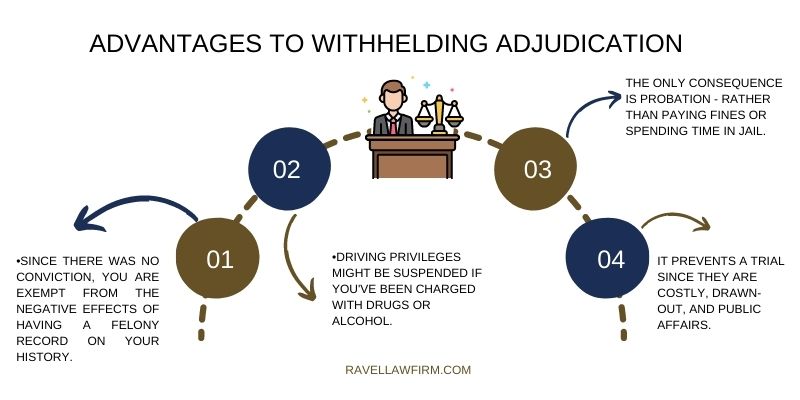When you are accused of breaking the law, you will likely be inundated with numerous complex legal phrases, such as deferring adjudication. Withholding adjudication means that the court chooses not to find you guilty, although it may find you guilty. The judge will still not convict you.
If you’ve been accused of a crime, you might be eligible for withholding of judgment. This case result is neither an acquittal, dismissal of your charges, or conviction. Instead, when a judge refuses to rule on your case, they impose a probationary term without finding you guilty of a crime.
It is challenging but crucial to comprehend because delaying judgment might be advantageous for you.

What does Adjudication Withhold Mean?
Adjudication refers to the legal decision and resolution of the matter through the criminal court system. Adjudication Withhold Means a judge may withhold adjudication if they decide not to find the defendant guilty.
A “withhold” is an unusual punishment in which the court mandates probation. Still, it does not formally find the offender guilty of a crime. You can also see the Signs Your Case Will Be Dismissed.
A Florida judge has the final say in a defendant who has been held liable for committing a crime. Withhold adjudication in Florida means the prisoner may have entered a plea of guilty, or the high court or the government’s evidence may have shown this. The court will have the final say over whether the defendant is formally found guilty of the crime.
As a result, the defendant escapes the harmful effects of a criminal conviction and saves the court the time and money of adjudication. The denial of judgment effectively pardons someone for acting out of character.
It enables the accused to avoid the everlasting burden of a criminal conviction and allows the court to pardon the accused’s lack of judgment.
Does adjudication withheld mean the case was dismissed?
Delaying adjudication does not result in the dismissal of a case. Instead, it means that a court or jury has found the accused person responsible for the accusations or that they have pleaded guilty or no contest. This means that the underlying accusations still stand and the case is still ongoing. Essentially, the defendant has been found guilty or there is enough evidence to support that conclusion.
When a judge delays the decision, they often sentence the offender to a probation period. In most cases, the defendant must successfully complete the probation to avoid a formal finding of guilt on their criminal record. However, if they fail to comply with the requirements of the probation, a formal judgment for the offense will be entered on their record.
When might a judge withhold adjudication?
Within specific bounds, the court has discretion regarding withholding. In its judgment, the judge might find the defendant responsible or stay and withhold the adjudication of blame if the court thinks that the accused is not prone to criminal behavior again. The ends of fairness and the well-being of society do not necessitate that the defendant currently suffers the penalties imposed by law.
Not every circumstance warrants a withhold. You typically are not eligible for a withhold if you have ever been convicted of a first-degree crime or have had prior withholds. You can always try To Get Charges Dropped Before Court Date.
Who Qualifies for Withheld Adjudication?
Suppose the court believed a person without a criminal record would not likely engage in a criminal action in the future. In that case, delaying adjudication is designed to give them a second opportunity. Courts occasionally feel it helpful to assist a convicted criminal to avoid falling into that trap. A guilty verdict can lead to restrictions and make it harder for a person to participate in society.
However, it is not a legal need to have a spotless criminal record in the past. It is occasionally possible to withhold adjudication from someone who has already received a criminal conviction, but this is considerably less common. The substance of the charge is the additional consideration for considering qualification for withheld adjudication.
Under Florida law, some crimes are never eligible. These are primarily significant felonies. Capital and life crimes are never eligible. A delay of adjudication can only be granted to someone convicted of a first-degree crime, which is punishable by life in prison if he is punished as a habitual offender.
The prosecutor must request in writing that judgment be postponed for the defendant to qualify. Or the court must enter written findings of extenuating factors by Florida Statute 921.0026 for defendants facing second or third-degree felonies.
Depending on a defendant’s past criminal record, some further specified crimes may be omitted, or the consequences of a deferred judgment may be restricted. However, a knowledgeable criminal defense lawyer can inform you whether a delay of adjudication is appropriate given the allegations that will affect that a court will do so in your case.
Consequences of Being Adjudicated Guilty
If you are found guilty, getting employment or carrying on in your current line of work can be difficult. Additionally, renting an apartment or a house could be challenging because it raises your insurance premiums in the future.
The most challenging issue with being found guilty is that it prohibits your criminal record from being sealed or expunged. One such decision can entirely stop that from occurring. Criminal records are frequently sealed or erased in my practice.
One felony case adjudication precludes any further sealing or expunction, according to Florida Statute. Closing or expunction refers to removing the information from the record that you don’t want background check users to be able to see.
Is Adjudication Withheld a Good Deal?
It depends, as with most solutions to complex legal matters. Someone accused of an offense in Florida may avoid a felony record, and many limitations accompany it by requesting a delay of adjudication.
In some circumstances, a person may be qualified to seal their history after getting a withhold. Additionally, it is advantageous that a defendant given probation is frequently subjected to this kind of supervision rather than a jail or prison sentence. Despite this, a decision that leads to a withhold of adjudication may nevertheless have drawbacks.
So, it’s crucial to consider both the advantages and disadvantages. Probation violations may result in severe repercussions. Additionally, most people need more expertise and information to evaluate the credibility of the evidence against them or determine whether they could have viable defenses.
Advantages to Withholding Adjudication
Although a withhold of adjudication is not the ideal result for your criminal case, it does have several benefits:

- Since there was no conviction, you are exempt from the harmful effects of having a felony record on your history. Losing your job, having issues getting a valid license, and having trouble finding new work are all consequences of even a conviction.
- Driving privileges might be suspended if you’ve been charged with drugs or alcohol. Even more substantial penalties, such as the termination of your right to possess weapons, apply to felony convictions.
- The only consequence is probation – Rather than paying fines or spending time in jail, you will only be required to adhere to the terms of your supervision. This may include performing community service, taking drug tests, receiving counseling, and ignoring the company of shady characters.
- It prevents a trial since they are costly, drawn-out and public affairs. You can prevent reputational harm by asking for the delaying of adjudication and averting a criminal trial.
Limitations of Withheld Adjudication
There are some essential restrictions in the Florida statute governing withheld adjudication. Recent actions by the Florida legislature and the state’s High Court have restricted the use of and advantages associated with deferred adjudication in the Sunshine State.
In DUI instances, withheld adjudication is not an option. Additionally, Florida Statute 775.08435, passed by the Florida legislature, prohibits withheld adjudication in instances involving first-degree offenses and makes getting one more challenging in cases involving second-degree felonies.
Withheld Adjudication and Future Criminal Charges
The Florida Supreme Court has determined that a postponed adjudication implies a conviction in subsequent criminal proceedings in several distinct circumstances. In a future criminal process, the case in which a finding of guilt was delayed will be considered when determining the sentence or otherwise escalating it.
On the federal level, the same is valid. Federal courts will treat a deferred adjudication the same way as a judgment since there is no similar provision in federal law, as is the gun ownership issue.
See Also: Charges Dismissed Vs Dropped
FAQ’s
When is withhold of adjudication offered?
A withhold is generally offered to first-time criminals who the court determines are unlikely to commit a crime again.
What does adjudicated sentence mean?
The judge may declare you pronounced guilty of any crime during the sentencing phase, which implies you have been found guilty of that offense in a court of law. Adjudication refers to a judge’s act of declaring or pronouncing.
Does adjudication withhold show background checks in Florida?
Yes, adjudication withheld is an element of your criminal background and will be seen in a background investigation unless the file has been sealed. Be ready for queries about your charge if you’re putting out a rental contract or applying for employment that needs a background check. Head them off by clarifying in advance.

Hi, I’m Brian Gary; I have my Doctor of Juridical Science (SJD) degree from SMU Dedman School of Law in Dallas. Over the years, I have dealt with many families and successful corporate Legal cases. I have counseled many people on legal matters, and along with my profession, I write about Law on my blog. Please feel free to contact me for counseling/case discussion; I’ll be happy to help you.